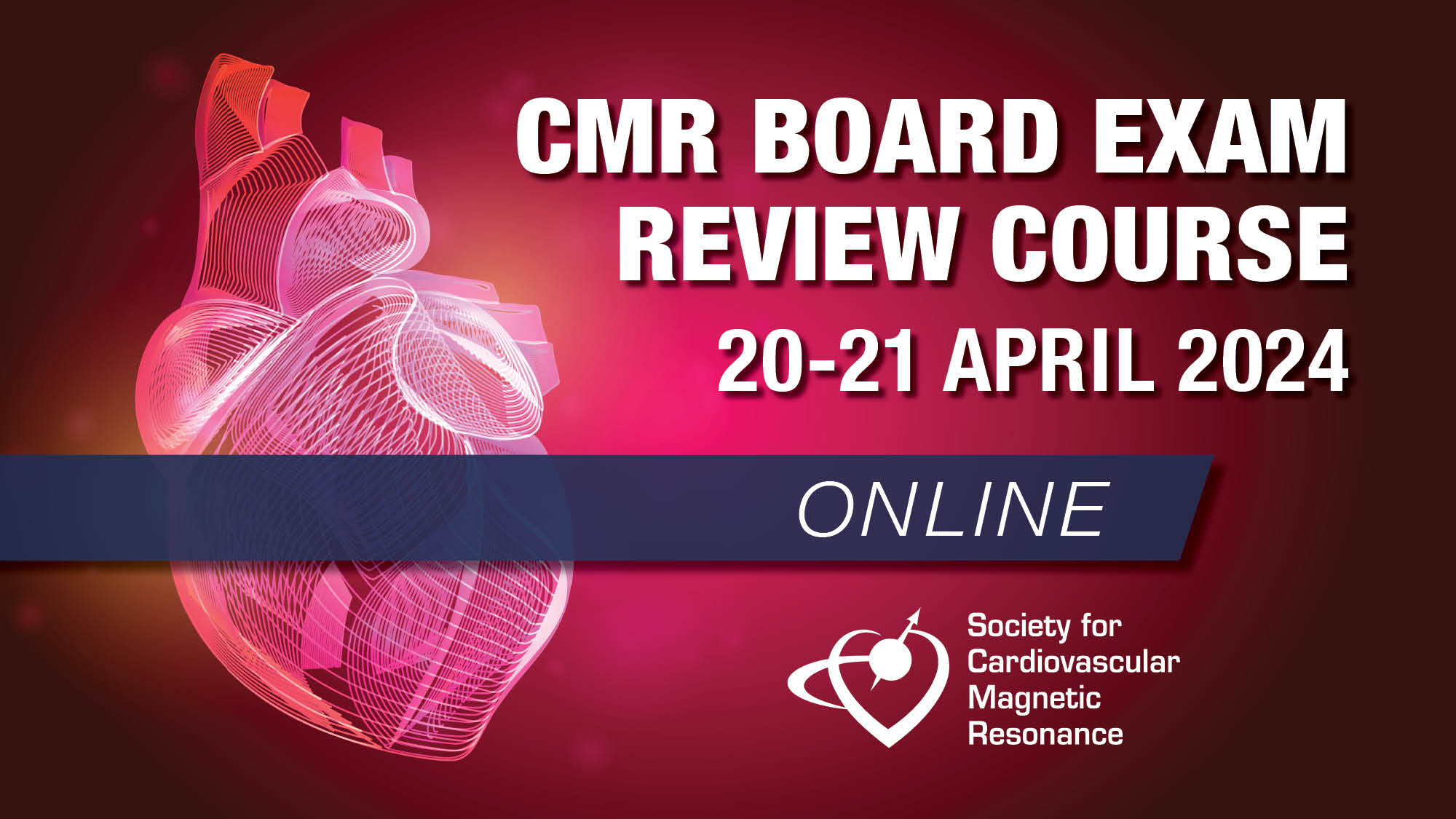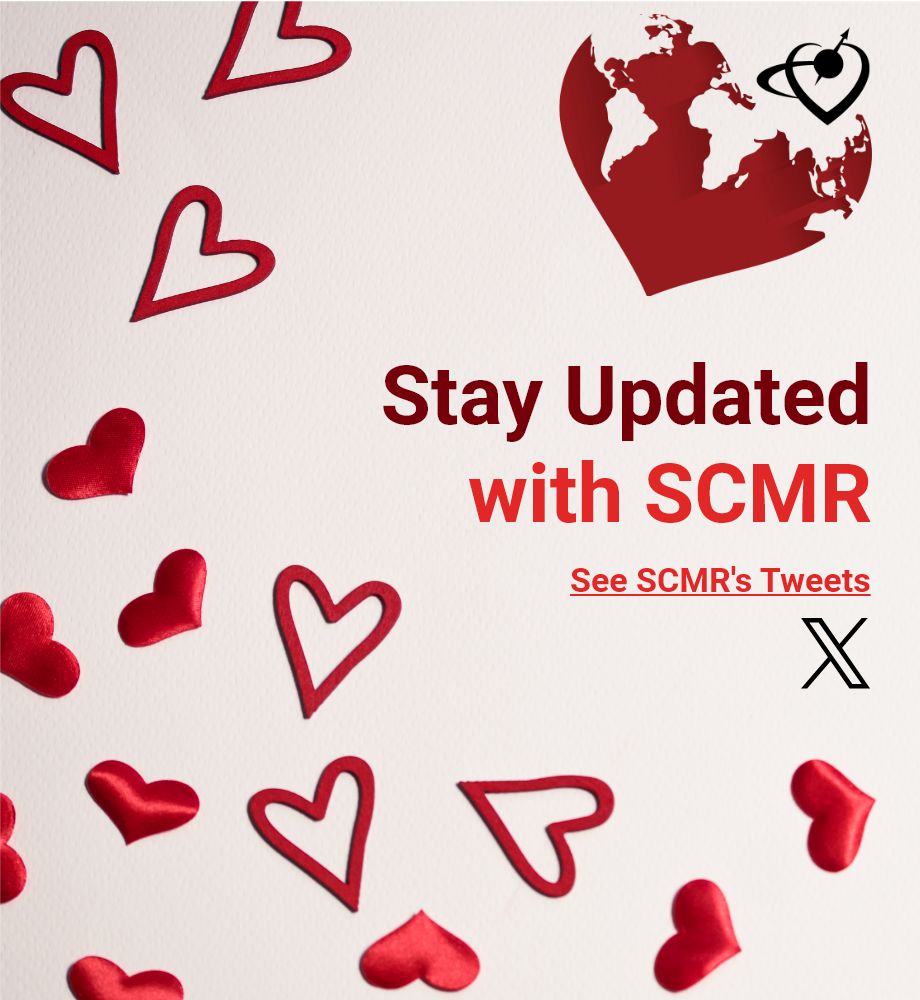CMR Board Exam Review Course
April 20-21, 2024
Location: Zoom Webinar

LEARNER NOTIFICATION
Society for Cardiovascular Magnetic Resonance
CMR Board Exam Review Course
Format (Online Live, Online In-Person, Enduring, etc.) Online Virtual Webinar
Meeting Dates Live: 20-21 April 2024
Meeting Location: Virtual
Acknowledgement of Financial Commercial Support
No financial commercial support was received for this educational activity.
Acknowledgement of In-Kind Support
No financial commercial support was received for this educational activity.
Satisfactory Completion
Learners must complete an evaluation form to receive a certificate of completion. Your chosen sessions must be attended in their entirety. Partial credit for individual sessions is not available. If you are seeking continuing education credit for a specialty not listed below, it is your responsibility to contact your licensing/certification board to determine course eligibility for your licensing/certification requirement.
Stated Practice Gap(s)
Knowledge Gap: Practitioners may lack comprehensive knowledge, skills, and abilities in preparing patients for CMR studies, selecting appropriate protocols, conducting CMR studies in various scenarios, post-processing images, and interpreting results for clinical decision-making.
Protocol Selection Gap: Physicians may lack the ability to select and perform appropriate protocols for specific clinical scenarios, including understanding when and how to apply different protocols based on patient characteristics and clinical indications.
Interpretation Gap: Practitioners need further training in interpreting normal and abnormal CMR exams, including anatomy, function, and physiology in order to be able to recognize patterns indicative of ischemic and nonischemic heart disease, as well as interpreting additional CMR exams such as those for cardiac masses, congenital heart disease, and vascular disease.
Post-Processing Gap: There is a lack of essential training in the ability to supervise and/or perform post-processing tasks related to CMR exams, which are critical for generating accurate and clinically relevant results.
Certification Preparation Gap: Practitioners may lack preparation specifically for passing the CBCMR Exam, which requires a deep understanding of the above-mentioned areas.
Learning Needs:
- Comprehensive Knowledge of CMR Studies: Practitioners need training to develop a comprehensive understanding of CMR studies, including the principles of CMR imaging, patient preparation techniques, and the ability to select appropriate protocols for different clinical scenarios.
- Protocol Selection Skills: Physicians require training to enhance their ability to select and perform appropriate protocols for specific clinical scenarios. This includes understanding the criteria for selecting protocols based on patient characteristics and clinical indications.
- Interpretation Skills: Practitioners need further training in interpreting normal and abnormal CMR exams. This includes understanding anatomy, function, and physiology related to CMR, as well as recognizing patterns indicative of various heart diseases and other conditions.
- Post-Processing Skills: There is a need for training in supervising and performing post-processing tasks related to CMR exams. This training is essential for generating accurate and clinically relevant results.
- Certification Preparation: Practitioners require preparation specifically for passing the CBCMR Exam. This preparation should focus on deepening their understanding of CMR imaging principles, protocol selection, image interpretation, and post-processing tasks.
- Clinical Decision-Making Skills: Training should focus on developing skills related to using CMR imaging results for clinical decision-making. This includes understanding how to integrate CMR findings into patient management plans.
- Continuing Education: Practitioners should engage in ongoing education to stay updated with advancements in CMR imaging technology, protocols, and interpretation techniques.
Expected Results Statement:
Upon completion of the training program, practitioners will demonstrate comprehensive knowledge, skills, and abilities in cardiovascular magnetic resonance (CMR) imaging. They will be able to prepare patients effectively for CMR studies, select and perform appropriate protocols for various clinical scenarios, interpret normal and abnormal CMR exams accurately, supervise and perform post-processing tasks related to CMR imaging, and integrate CMR findings into clinical decision-making processes. Additionally, practitioners will be prepared to pass the CBCMR Exam, showcasing their deep understanding of CMR principles and practices. Overall, practitioners will be equipped to provide high-quality CMR imaging services, leading to improved patient care and outcomes.
Learning Objectives:
At the conclusion of this meeting, participants will have improved competence and professional performance in their ability to:
- Select and perform appropriate protocols for specific clinical scenarios.
- Perform CMR exams.
- Interpret normal and abnormal CMR exams: anatomy, function, and physiology.
- Interpret ischemic and nonischemic heart disease CMR Exams
- Interpret additional CMR exams including cardiac masses, congenital heart disease, and vascular disease.
- Supervise and/or perform post processing tasks.
Accreditation Statement
Society for Cardiovascular Magnetic Resonance (SCMR) is accredited by the Accreditation Council for Continuing Medical Education to provide continuing medical education for physicians.
SCMR designates this live/virtual activity for a maximum of 17.5 AMA PRA Category 1 Credits™. Physicians should claim only the credit commensurate with the extent of their participation in the activity.
VIEW FULL LEARNER NOTIFICATION
Join us for the 2024 CMR Board Exam Review Course. The CMR Certification Examination Preparatory Course organized by SCMR, is intended to align to the objectives for a new physician certification in cardiovascular magnetic resonance
(CMR) launched by the Alliance for Physician Certification & Advancement™ (APCA™).
The Certification Board of Cardiovascular Magnetic Resonance (CBCMR) examination assesses candidates on their knowledge, skills and abilities in preparing patients for CMR studies, selecting appropriate protocols, conducting CMR studies
in a spectrum of scenarios and interpreting the results, and performing post-processing tasks. For more information regarding the examination, please visit here.
Registrants will receive:
- Access to the on-demand CMR Exam Review Course in their online learning portal
- Access to the streamed talks followed by live Q&A from the presenters & moderators (see agenda below)
- Ability to submit questions to the speakers live during the Q&A sessions
REGISTRATION
This course is $300 for SCMR members and $350 for nonmembers
| 20 April, 2024 | Presentation Start Time (PDT) | Presentation End Time (PDT) |
| Session 1: Basics of MRI | 8:00 AM | 10:50 AM |
| Welcome address | 8:00 AM | 8:10 AM |
| Basic MR Physics | 8:10 AM | 8:25 AM |
| Basic pulse sequences for MR imaging | 8:25 AM | 8:45 AM |
| Principles of fast imaging | 8:45 AM | 9:05 AM |
| MRI Safety | 9:05 AM | 9:25 AM |
| CMR and devices – patient preparation, safety and artifacts | 9:25 AM | 9:50 AM |
| Live Q&A | 9:50 AM | 10:50 AM |
| Break | 10:50 AM | 11:20 AM |
| Session 2: Select and perform protocols | 11:20 AM | 2:20 PM |
| Cine Imaging | 11:20 AM | 11:40 AM |
| LGE imaging | 11:40 AM | 12:00 PM |
| CMR stress perfusion imaging | 12:00 PM | 12:20 PM |
| CMR for flow quantification | 12:20 PM | 12:40 PM |
| Optimizing CMR image quality and trouble-shooting during acquisition | 12:40 PM | 1:00 PM |
| Recognizing and minimizing common CMR artifacts | 1:00 PM | 1:20 PM |
| Live Q&A | 1:20 PM | 2:20 PM |
| Break | 2:20 PM | 2:50 PM |
| Session 3: Ischemic and nonischemic heart disease | 2:50 PM | 5:50 PM |
| CMR for T1 & T2 mapping | 2:50 PM | 3:10 PM |
| CMR for assessing acute coronary syndromes | 3:10 PM | 3:30 PM |
| Acute myocarditis and the Lake Louise Criteria | 3:30 PM | 3:50 PM |
| Pericardial disease | 3:50 PM | 4:10 PM |
| CMR for cardiac involvement in systemic diseases and infections | 4:10 PM | 4:30 PM |
| CMR for assessing cardiac masses and tumors | 4:30 PM | 4:50 PM |
| Live Q&A | 4:50 PM | 5:50 PM |
| Adjourn for the day |
Day 2 – 21 April, 2024
| 21 April, 2024 | Presentation Start Time (PDT) | Presentation End Time (PDT) |
Session 4: Nonischemic heart disease, pericardial disease, | 8:00 AM | 11:00 AM |
| CMR for assessing HCM | 8:00 AM | 8:20 AM |
| CMR for assessing DCM and ARVC | 8:20 AM | 8:40 AM |
| CMR for infiltrative and storage heart disease | 8:40 AM | 9:00 AM |
| CMR for assessing non-compaction cardiomyopathy | 9:00 AM | 9:20 AM |
| CMR for iron overload | 9:20 AM | 9:40 AM |
| CMR for differentiating athlete’s heart from cardiomyopathies | 9:40 AM | 10:00 AM |
| Live Q&A | 10:00 AM | 11:00 AM |
| Break | 11:00 AM | 11:30 AM |
| Session 5: Valvular heart disease and congenital heart disease | 11:30 AM | 2:30 PM |
| CMR for valvular heart disease | 11:30 AM | 11:50 AM |
| Common congenital Heart Disease | 11:50 AM | 12:15 PM |
| Complex congenital Heart Disease | 12:15 PM | 12:45 PM |
| Understanding shunts | 12:45 PM | 1:30 PM |
| Live Q&A | 1:30 PM | 2:30 PM |
| Break | 2:30 PM | 3:00 PM |
| Session 6: Vascular Disease | 3:00 PM | 5:40 PM |
| CMR for assessment of aortic diseases | 3:00 PM | 3:20 PM |
| CMR for assessment of pulmonary arteries and veins | 3:20 PM | 3:40 PM |
| CMR for assessment of coronary arteries | 3:40 PM | 4:00 PM |
| CMR for assessment of peripheral vascular disease | 4:00 PM | 4:20 PM |
| Extracardiac and extravascular findings | 4:20 PM | 4:40 PM |
| Live Q&A | 4:40 PM | 5:40 PM |
| Adjourn |







